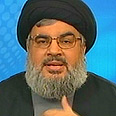
A massive explosion rocked a Hezbollah stronghold near Siddiqin in the southern coastal city of Tyre in southern Lebanon overnight Wednesday, a security source told The Daily Star. There were no reports of injuries.
Local media said the explosion likely took place at a Hezbollah arms cache.
Related stories:
- Report: CIA forced to curb spying in Lebanon, Iran
- Report: Hezbollah considering military coup if Assad falls
- Blast at Lebanon hotel hosting UN staff
The source told the Lebanese newspaper that the cause of the blast could not be determined because Hezbollah cordoned off the area.
American blogger Richard Silverstein claimed Israel was behind the explosion. Quoting an Israeli official with "considerable military experience," the blogger wrote "IDF military intelligence (Aman) has out foxed Hezbollah by deliberately crash-landing a booby-trapped Trojan Horse drone in southern Lebanon.
"For over a year, Hezbollah has been attempting to discover how to jam the ground signals commanding the drone so as to disable them in flight. When it discovered the downed craft, its operatives must’ve crowed that they’d finally discovered the key to success. This bit of hubris is how Aman drew Hezbollah into its net. Its soldiers dutifully collected the imagined intelligence trophy and brought it to a large weapons depot it controlled in the area. Once inside the arms cache, Aman detonated the drone causing a massive explosion," Silverstein claimed.
Lebanese security forces were unable to access the scene of the explosion after the Shiite group set up a security perimeter around the blast site, which is located in a valley called Wadi Al-Jabal al-Kabir between Siddiqin and Deir Ames, the source added.
The blast occurred in an area that is under UN control. According to UN Resolution 1701, which ended the Second Lebanon War, Hezbollah is forbidden from storing arms in this region. A UNIFIL team is expected to launch an investigation into the explosion.
UN peacekeepers stationed in southern Lebanon told The Daily Star that they heard about the explosion on the news. "We have no information at the moment. We are checking this report," UNIFIL spokesman Andrea Tenenti was quoted as saying.
Hezbollah declined comment on reports of an explosion.
Not first time
About a year ago a number of explosions shook Hezbollah weapons caches in Lebanon. The blasts were believed to be the result of faulty maintenance.
A week ago two explosions hit an alcohol shop and a hotel in Tyre before dawn, causing damage but no injuries.
The explosion at the Queen Elissa hotel shattered glass and hurled debris into the street, damaging cars including two belonging to the United Nations UNIFIL force deployed to keep peace near the frontier with Israel.
An army source said the shop and hotel appeared to have been chosen because they sold alcohol, not because of any link to the peacekeeping force.
Alcohol is forbidden by Islam but legal in Lebanon which has a large Christian community. Shops selling it have come under attack in the past by militants.
Two roadside bombs in May and July wounded six French UNIFIL soldiers and six Italians, prompting Italy to announce it would reduce its peacekeeping contingent in Lebanon.
Meanwhile, the military advisor to Iranian Supreme Leader Ali Khamenei warned Israel that should it attack Iran's nuclear sites, the Islamic Republic will retaliate with missiles.
General Yahya Rahim Safavi told Iran's Arabic-language satellite channel Al-Alam that in case of an attack by Israel, Hezbollah in Lebanon and Hamas in Gaza will also join the fighting. "There will be no need for Iran to launch ballistic missiles at Israel, because all the Zionist cities are within the range of our ally Hezbollah's Katyusha (rockets)," he said.
"We have obtained extensive intelligence on all the Zionist regime's military maneuvers, including the joint exercises with NATO in the Mediterranean Sea and the joint drill with Italy, which focused on long flights," he added.
Dudi Cohen, Reuters contributed to the report
-
Receive Ynetnews updates
directly to your desktop















